1688 Born: Pierre de Marivaux, French author and playwright (d. 1763)
Pierre Carlet de Chamblain de Marivaux (4 February 1688 – 12 February 1763), commonly referred to as Marivaux, was a French novelist and dramatist.
He is considered one of the most important French playwrights of the 18th century, writing numerous comedies for the Comédie-Française and the Comédie-Italienne of Paris. His most important works are Le Triomphe de l'amour, Le Jeu de l'amour et du hasard and Les Fausses Confidences. He also published a number of essays and two important but unfinished novels, La Vie de Marianne and Le Paysan parvenu.
Stamps from Monaco and France depicting de Marivaux
1740 Born: Carl Michael Bellman, Swedish poet and composer (d. 1795)
Carl Michael Bellman (4 February 1740 – 11 February 1795) was a Swedish songwriter, composer, musician, poet and entertainer. He is a central figure in the Swedish song tradition and remains a powerful influence in Swedish music, as well as in Scandinavian literature, to this day. He has been compared to Shakespeare, Beethoven, Mozart, and Hogarth, but his gift, using elegantly rococo classical references in comic contrast to sordid drinking and prostitution—at once regretted and celebrated in song—is unique.
Bellman is best known for two collections of poems set to music, Fredman's songs (Fredmans sånger) and Fredman's epistles (Fredmans epistlar). Each consists of about 70 songs. The general theme is drinking, but the songs "most ingeniously" combine words and music to express feelings and moods ranging from humorous to elegiac, romantic to satirical.
Bellman's patrons included King Gustav III of Sweden, who called him a master improviser. Bellman's songs continue to be performed and recorded by musicians from Scandinavia and in other languages, including English, French, German, Italian and Russian. Several of his songs including Gubben Noak and Fjäriln vingad are known by heart by many Swedes. His legacy further includes a museum in Stockholm and a society that fosters interest in him and his work.
Swedish stamps depicting Bellman
1746 Born: Tadeusz Kościuszko, Polish-Lithuanian general and engineer (d. 1817)
Andrzej Tadeusz Bonawentura Kościuszko (English: Andrew Thaddeus Bonaventure Kosciuszko;4 or 12 February 1746 – 15 October 1817) was a Polish-Lithuanian military engineer, statesman, and military leader who became a national hero in Poland, Lithuania, Belarus, and the United States. He fought in the Polish–Lithuanian Commonwealth's struggles against Russia and Prussia, and on the US side in the American Revolutionary War. As Supreme Commander of the Polish National Armed Forces, he led the 1794 Kościuszko Uprising.
Kościuszko was born in February 1746, in a manor house on the Mereczowszczyzna estate in Brest Litovsk Voivodeship, Grand Duchy of Lithuania, a part of the Polish–Lithuanian Commonwealth. At age 20, he graduated from the Corps of Cadets in Warsaw, Poland. After the start of the civil war in 1768, Kościuszko moved to France in 1769 to study. He returned to the Commonwealth in 1774, two years after the First Partition, and was a tutor in Józef Sylwester Sosnowski's household. In 1776, Kościuszko moved to North America, where he took part in the American Revolutionary War as a colonel in the Continental Army. An accomplished military architect, he designed and oversaw the construction of state-of-the-art fortifications, including those at West Point, New York. In 1783, in recognition of his services, the Continental Congress promoted him to brigadier general.
Upon returning to Poland in 1784, Kościuszko was commissioned as a major general in the Polish–Lithuanian Commonwealth Army in 1789. After the Polish–Russian War of 1792 resulted in the Second Partition of Poland, he commanded an uprising against the Russian Empire in March 1794 until he was captured at the Battle of Maciejowice in October 1794. The defeat of the Kościuszko Uprising that November led to Poland's Third Partition in 1795, which ended the Commonwealth. In 1796, following the death of Tsaritsa Catherine II, Kościuszko was pardoned by her successor, Tsar Paul I, and he emigrated to the United States. A close friend of Thomas Jefferson's, with whom he shared ideals of human rights, Kościuszko wrote a will in 1798, dedicating his U.S. assets to the education and freedom of the U.S. slaves. Kościuszko eventually returned to Europe and lived in Switzerland until his death in 1817. The execution of his testament later proved difficult, and the funds were never used for the purpose Kościuszko intended.
Stamps from the US and Poland depicting Tadeusz Kosciuszko
George Washington (February 22, 1732 – December 14, 1799) was an American political leader, military general, statesman, and Founding Father who served as the first president of the United States from 1789 to 1797. Previously, he led Patriot forces to victory in the nation's War for Independence. He presided at the Constitutional Convention of 1787, which established the U.S. Constitution and a federal government. Washington has been called the "Father of His Country" for his manifold leadership in the formative days of the new nation.
Washington received his initial military training and command with the Virginia Regiment during the French and Indian War. He was later elected to the Virginia House of Burgesses and was named a delegate to the Continental Congress, where he was appointed Commanding General of the Continental Army. He commanded American forces, allied with France, in the defeat and surrender of the British during the Siege of Yorktown. He resigned his commission after the Treaty of Paris in 1783.
Washington played a key role in adopting and ratifying the Constitution and was then elected president (twice) by the Electoral College. He implemented a strong, well-financed national government while remaining impartial in a fierce rivalry between cabinet members Thomas Jefferson and Alexander Hamilton. During the French Revolution, he proclaimed a policy of neutrality while sanctioning the Jay Treaty. He set enduring precedents for the office of president, including the title "President of the United States", and his Farewell Address is widely regarded as a pre-eminent statement on republicanism.
Washington owned slaves, and in order to preserve national unity he supported measures passed by Congress to protect slavery. He later became troubled with the institution of slavery and freed his slaves in a 1799 will. He endeavored to assimilate Native Americans into Anglo-American culture but combated indigenous resistance during occasions of violent conflict. He was a member of the Anglican Church and the Freemasons, and he urged broad religious freedom in his roles as general and president. Upon his death, he was eulogized as "first in war, first in peace, and first in the hearts of his countrymen". He has been memorialized by monuments, art, geographical locations, stamps, and currency, and many scholars and polls rank him among the greatest American presidents.
US stamps depicting George Washington
1897 Born: Ludwig Erhard, German soldier and politician, 2nd Chancellor of West Germany (d. 1977)
Ludwig Wilhelm Erhard (4 February 1897 – 5 May 1977) was a German politician affiliated with the CDU, and the second Chancellor of the Federal Republic of Germany (West Germany) from 1963 until 1966. He is often famed for leading the West German postwar economic reforms and economic recovery (Wirtschaftswunder, German for "economic miracle") in his role as Minister of Economic Affairs under Chancellor Konrad Adenauer from 1949 to 1963. During that period he promoted the concept of the social market economy (soziale Marktwirtschaft), on which Germany's economic policy in the 21st century continues to be based. In his tenure as Chancellor, however, Erhard lacked support from Adenauer, and failed to win the public's confidence in his handling of a budget deficit and his direction of foreign policy. His popularity waned, and he resigned his chancellorship on 1 December 1966.
German stamps depicting Ludwig Wilhelm Erhard
Lindbergh was an officer in the U.S. Army Air Corps Reserve, and he received the United States' highest military decoration, the Medal of Honor, for his transatlantic flight. His achievement spurred interest in both commercial aviation and air mail, which revolutionized the aviation industry, and he devoted much time and effort to promoting such activity.
In March 1932, Lindbergh's infant son, Charles Jr., was kidnapped and murdered in what the American media called the "Crime of the Century". The case prompted the United States Congress to establish kidnapping as a federal crime if the kidnapper crosses state lines with a victim. By late 1935, the hysteria surrounding the case had driven the Lindbergh family into exile in Europe, from which they returned in 1939.
In the years before the United States entered World War II, his non-interventionist stance and statements about Jews led some to suspect he was a Nazi sympathizer, although Lindbergh never publicly stated support for Nazi Germany. He opposed not only the intervention of the United States but also the provision of aid to the United Kingdom. He supported the anti-war America First Committee and resigned his commission in the U.S. Army Air Forces in April 1941 after President Franklin Roosevelt publicly rebuked him for his views. In September 1941, Lindbergh gave a significant address, titled "Speech on Neutrality", outlining his views and arguments against greater American involvement in the war.
Lindbergh did ultimately express public support for the U.S. war effort after the Japanese attack on Pearl Harbor and the subsequent United States declaration of war upon Germany. He flew 50 missions in the Pacific Theater of World War II as a civilian consultant, but did not take up arms as Roosevelt refused to reinstate his Air Corps colonel's commission. In his later years, Lindbergh became a prolific author, international explorer, inventor, and environmentalist, eventually dying of lymphoma in 1974, at age 72.
US stamp and FDC issued to commemorate Lindbergh's transatlantic flight
According to the biography published by the Nobel Foundation, "It may well be said that Lorentz was regarded by all theoretical physicists as the world's leading spirit, who completed what was left unfinished by his predecessors and prepared the ground for the fruitful reception of the new ideas based on the quantum theory." He received many other honors and distinctions, including a term as chairman of the International Committee on Intellectual Cooperation, the forerunner of UNESCO, between 1925 and 1928.
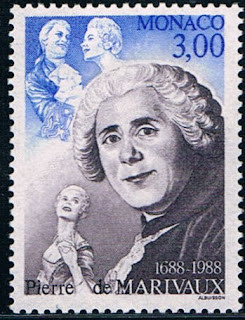
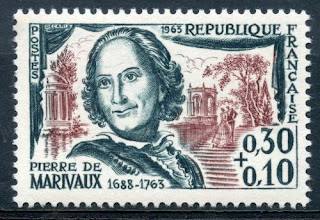
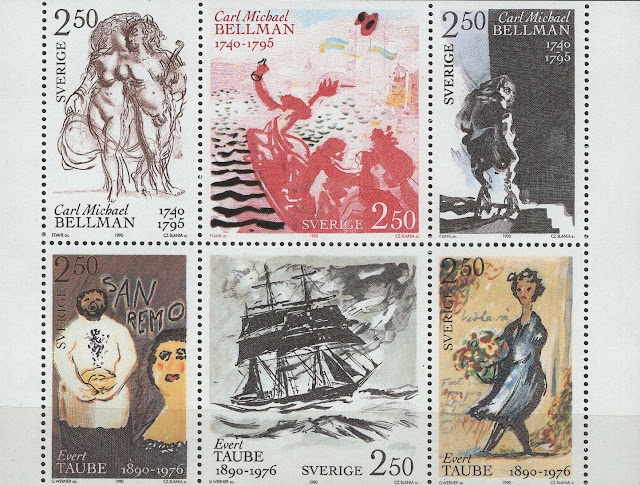




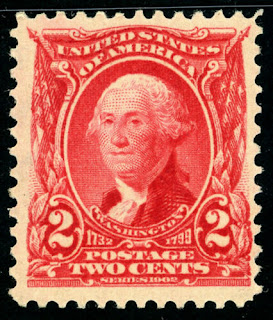
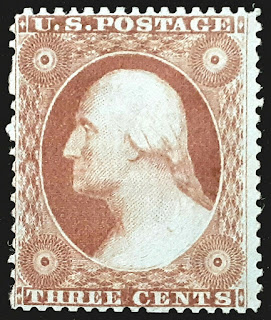
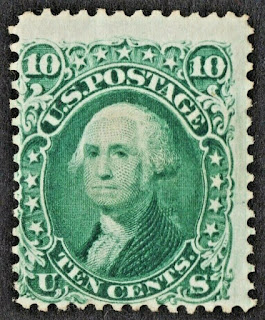


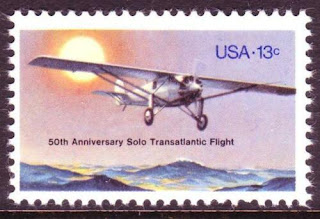
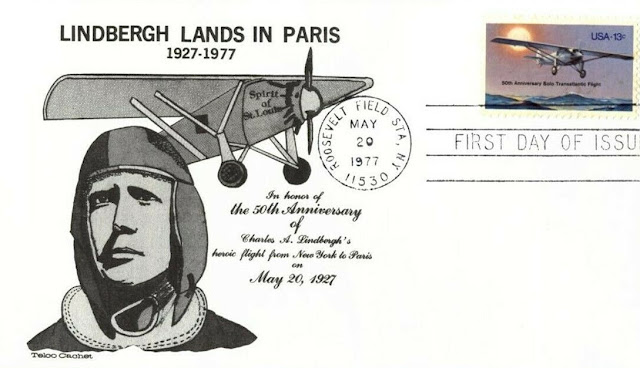

No comments:
Post a Comment